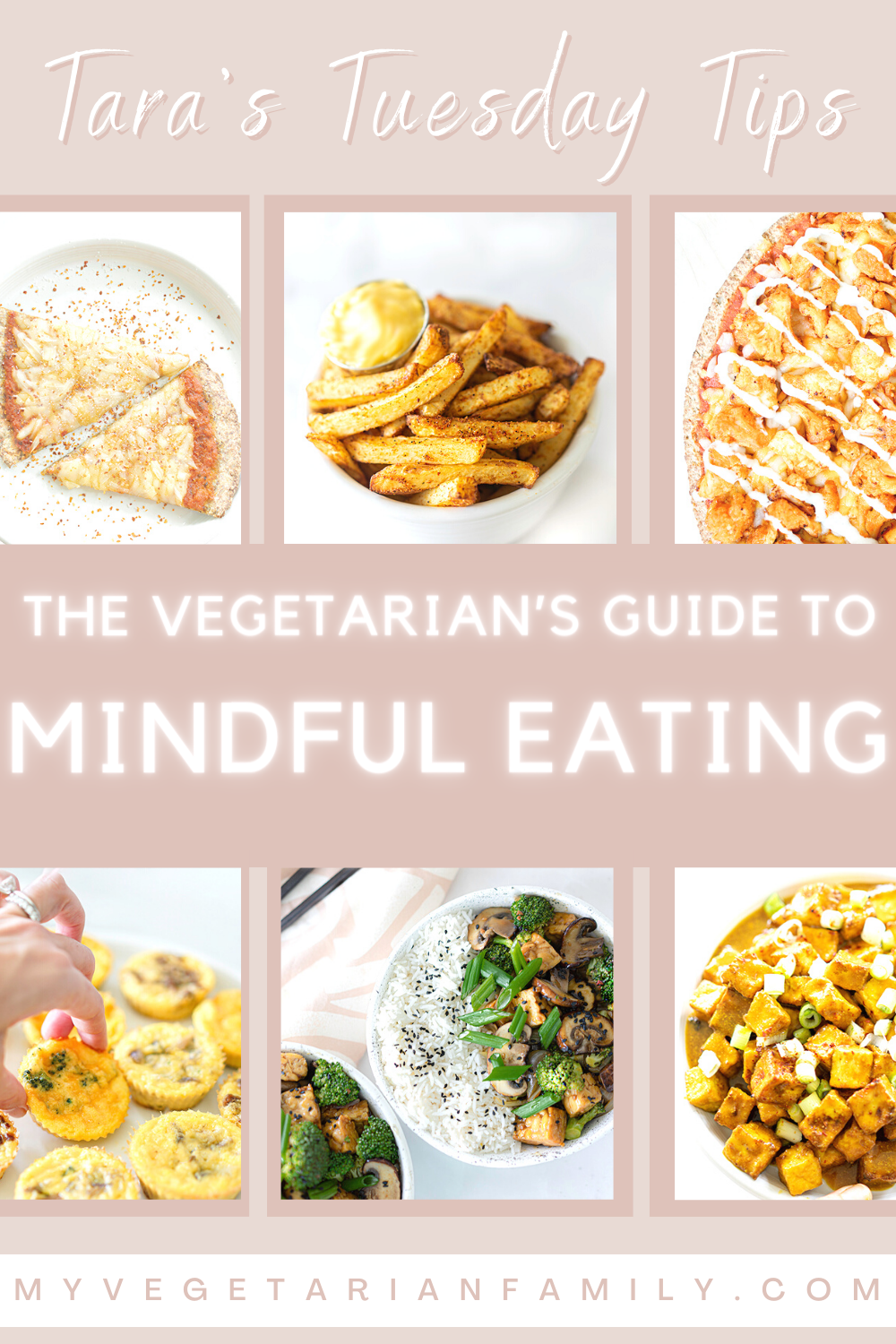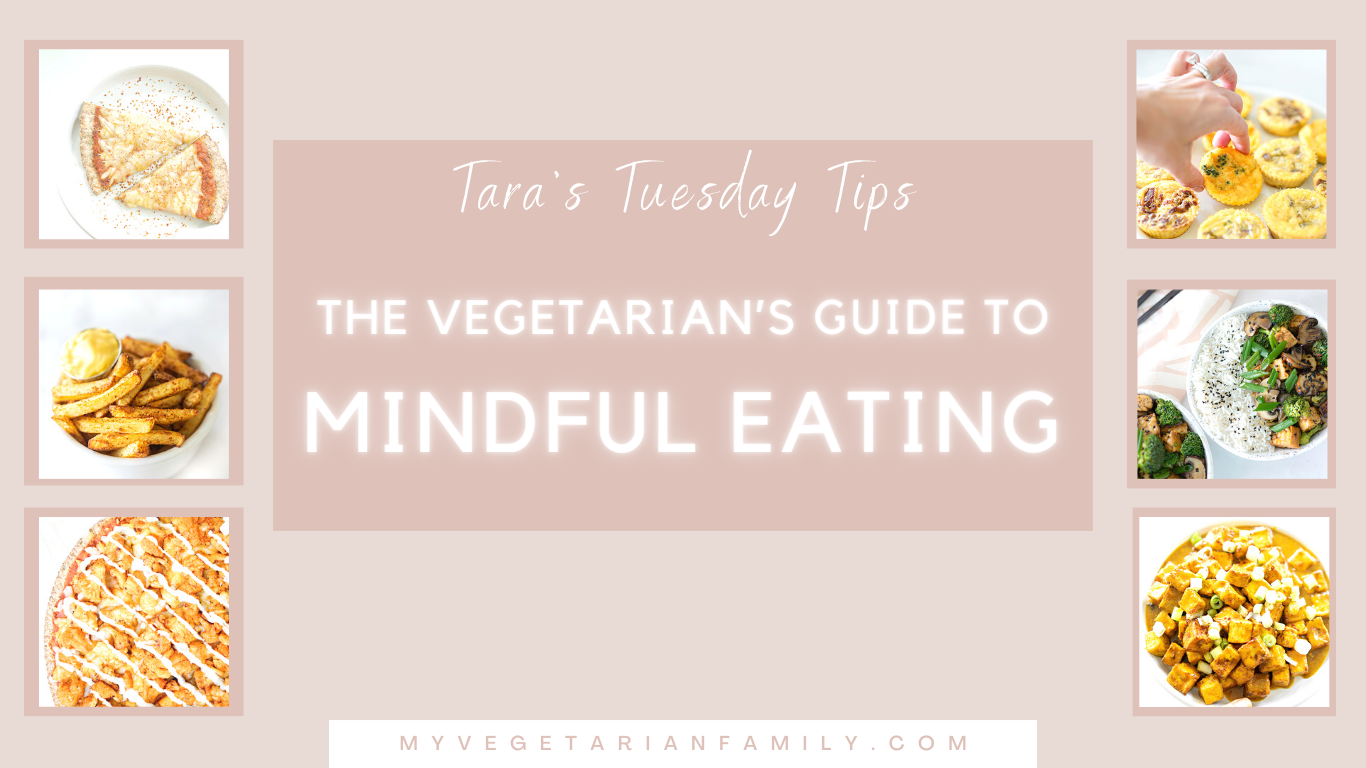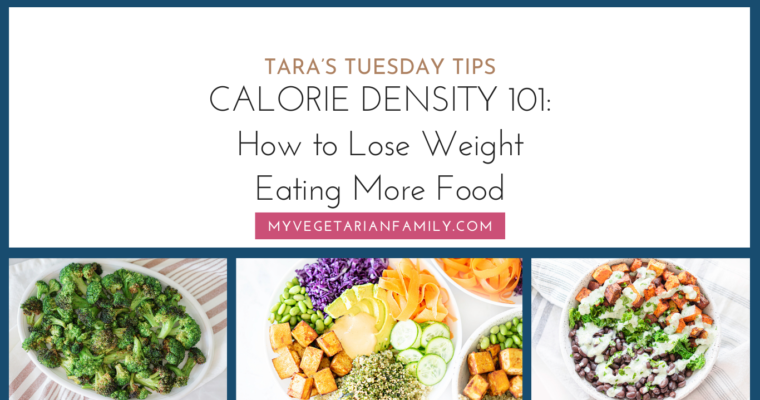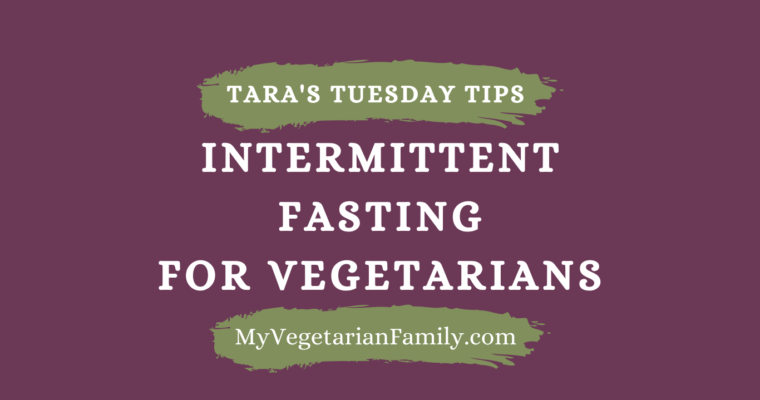Mindful eating is not just another diet. It isn’t complicated or cumbersome with calculators, rules, measurements, and restriction. Eating mindfully is a practice of being aware of cues that influence your food choices. There are SO MANY benefits to learning how to eat mindfully. This is a skill I wish everyone, vegetarian or not, would work on fine tuning. So, this Tuesday, I bring you The Vegetarian’s Guide to Mindful Eating.
Tara’s Tuesday Tips: The Vegetarian’s Guide to Mindful Eating
When do I want to eat, what do I want to eat, how much is enough, and how does it make me feel? Sounds simple, but how does it somehow get to be so complicated? Mindful eating for vegetarians is important for overall mental and physical health. As vegetarians, we are naturally more mindful eaters but we can still get stuck in a pattern of eating out of boredom, not taking the time to savor and enjoy food with the people in our lives, eating with distractions, binge eating, yo-yo dieting, and more. My tips today will help jump start your vegetarian mindful eating journey!
What is Mindfulness?
You may have heard this term popping up more and more in recent times as our worlds become more fast-paced with life coming at us in a few hundred words at a time on our devices. When we are mindful, we are present or conscious of whatever we are focusing on in that moment. Practicing mindfulness has helped countless people develop vital skills to live their lives with more intention and focus.
What is Mindful Eating?
Eating mindfully encourages us to eat with all of our senses focusing on experiencing the food we are eating. Eating this way shifts the focus of food from counting calories, carbohydrates, and grams of sugar to intentionally choosing foods and being aware of how they taste, look, smell, and most importantly how they make us feel. Mindful eating encourages us to trust our decisions of which foods to eat and which to avoid not because of rules or intentional restriction but because we appreciate the food, without judgement, for its taste + ultimately the purpose it is serving.
Why is Mindful Eating Helpful?
- Helps with self-determining appropriate portion sizes.
- Prevents impulsive and emotional eating.
- Brings awareness to eating patterns and has been shown to improve overall diet/body size/blood sugar regulation over time.
- Eating mindfully results in healthier food choices, slower eating, ease of recognizing fullness.
- Can help with the appreciation of where the food has come from, how it was prepared, the environment in which it is eaten.
Why are Vegetarians Naturally More Mindful Eaters?
As vegetarians, we pay closer attention to where our food has come from. For me, I will not eat anything that has had to lose its life for me to eat. I am routinely using the practice of mindful eating simply by pausing and paying attention to that one fact: where has this food come from? Some plant-based eaters take this one step further and choose to exclude any foods that were produced under any circumstances in which an animal could have been harmed.
Tara’s 5 Tips to Help You Eat Mindfully as a Vegetarian
1. Pause + taste your food.
Being more “awake” while eating allows you to slow down, enjoy your food, eat when you feel hungry but not famished, and stop eating when you are full.
2. Think about where your food came from
From the harvesting of the crop to the stocking of the shelf in the store, the recipe creator, those that chopped and seasoned your food to get it to taste and smell the way it does. Appreciating the process of how your meal got to you makes you more connected to how the food makes you feel.
3. Are you distracted while you eat?
Vegetarian or not, it is so easy to ignore the signals our bodies are giving us. The world is a busy place, so this takes some practice. Pick a meal every day or every week pay attention to only the act of eating. You will be surprised what you feel and taste and smell when you do this.
4. Make a shopping list
When making your list, consider when you will eat the food, who you will eat it with, where it came from and how it was processed, and how that food has made you feel in the past (bloated, hungry, full, irritable, tired). Stick to the list!
5. Be intentional
What type of vegetarian are you and why? Remember this when you go shopping, choose a restaurant, meal prep, and sit down to eat. What is the purpose of my food choice? Fuel for exercise, a quick bite before work, an outing with a loved one, a celebration. Remember the purpose and keep that intention at the top of mind when eating.
Food For Thought
If you’ve been stopping by here for a while, you have heard me say before that there is no diet quick fix or magic pill. There is no one size fits all for dieting, weight loss, and a long term healthy relationship with food. Mindful eating is about as good as it gets. If you can learn how to pause, think about where your food came from, prepare it with intention, eat with intention, and then take notice of how that food made you feel, you are giving yourself the best chance at long term weight management, health, and peace with food that you can possibly get. Above all, remember to always enjoy good food in the company of good people.
All the best,
Tara 🌿
A Few Other Tips You Might Enjoy:
Vegetarian Mediterranean Diet Foods to Eat
How To Eat To Prevent Diabetes
Calorie Density 101: How to Lose Weight Eating More Food
The Vegetarian’s Guide to The Mediterranean Diet
Tara’s Tips For Plant-Powered Athletes
Is Intermittent Fasting Right For You?

⭐️Did you enjoy The Vegetarian’s Guide to Mindful Eating? Leave a comment below, I love to hear from you! ⭐️
📷I love to see your creations! Tag @myvegetarianfamily on Instagram and hashtag it #myvegetarianfamily
💚Be sure to subscribe here to my weekly emails for tips and recipes so that you never miss a veggie thing!


